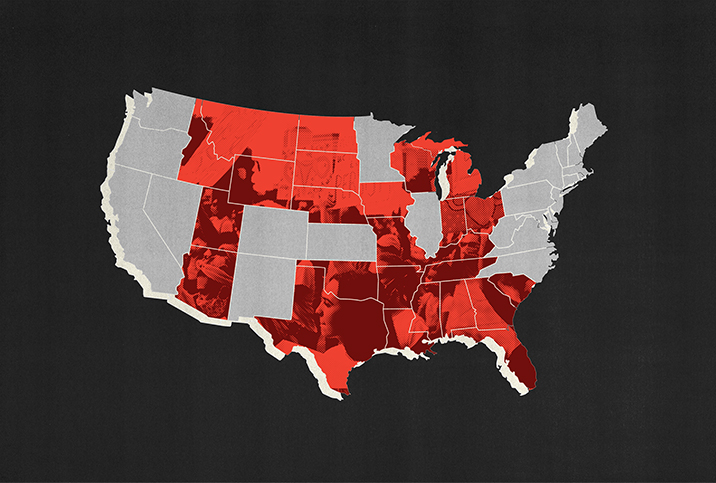The State(s) of Abortion Access

Editor's note: This story has been updated as of May 28, 2023, to reflect changes in state laws following the United States Supreme Court's decision in Dobbs v Jackson Women's Health Organization. The removal of federal protection for abortion rights represents a seismic shift with far-reaching implications. As the world's largest sexual health platform, Giddy is committed to thorough and fact-based coverage of this issue. Here, we present the third in a series of data-driven articles exploring the changing landscape of abortion rights and its effects on sexual health in America.
All across the country, Americans are awaiting the U.S. Supreme Court's decision in Dobbs v. Jackson Women's Health Organization. The decision, which is expected sometime in June, could overturn abortion rights that have been guaranteed in this country since the court's landmark 1973 decision in Roe v. Wade.
Justice Samuel Alito's draft opinion in the case was leaked in early May and argued that "Roe was egregiously wrong from the start." If the other conservative justices vote in line with Alito, Roe will be overturned.
Ahead of the decision, several states, such as Oklahoma, have already begun rolling back abortion rights, and many more are poised to severely limit abortion or restrict it entirely. Some have "trigger bans"—laws created after Roe that will automatically ban abortion if it is overturned—while others have pre-Roe legislation still on the books that will be able to be enforced again.
Here we take a look at the state of abortion at the state level, including current restrictions such as targeted regulation of abortion providers (TRAP) laws, parental notification or consent for minors, biased counseling requirements, mandatory ultrasound and waiting periods. We also look at the laws that are likely to go into effect if the Supreme Court overturns Roe, according to the Center for Reproductive Rights.

Alabama
Before Dobbs, an abortion could be performed up to 22 weeks after the last menstrual period. After that point, abortion was only possible in cases of life endangerment (for the mother) or severely compromised physical health.
Previous restrictions included TRAP laws, parental consent for minors, biased counseling requirements, mandatory ultrasound and a 48-hour waiting period.
In 2019, Alabama attempted a total abortion ban without exception.
Alabama is one of the most strict states in the U.S. regarding abortion. On June 24, 2022, Alabama started enforcing its abortion ban. All abortion after the point of conception is illegal in Alabama. There are no exceptions for rape or incest.
Alaska
Abortion has been legal in Alaska under the state constitution since 1997. It is legal at all stages of pregnancy, even after Dobbs. Current restrictions include TRAP laws.
Arizona
In March 2022, Arizona passed a 15-week abortion ban with an exception for medical emergencies but not for rape or incest. The ban went into effect in September 2022.
Restrictions include TRAP laws, parental consent for minors, biased counseling requirements, mandatory ultrasound and a 24-hour waiting period.
Arkansas
Before Dodd, Abortion was legal up to 22 weeks after the last menstrual period. Restrictions included TRAP laws, parental consent for minors, biased counseling requirements, mandatory ultrasound and a 72-hour waiting period.
In 2021, Arkansas attempted to enact a total ban that was temporarily enjoined. The state also has a pre-Roe ban on the books.
After Dodd, Arizona enforced its trigger ban and prohibited abortion.
California
Abortion has been legal under the California State Constitution since 1969, four years before Roe. It is legal up to fetal viability.
In November 2022, Californians added abortion and contraceptive rights to the state constitution with the approval of Prop 1.
Colorado
Abortion is legal at all stages of pregnancy. In 2022, Colorado passed statutory protections that state abortion is a fundamental right. Restrictions include TRAP laws and parental notification for minors.
Connecticut
Abortion is legal up to fetal viability. It is protected under state law, and Connecticut expanded protections in 2022 for abortion providers and those who perform or assist in reproductive healthcare services. Restrictions include TRAP laws.
Delaware
Abortion is legal up to fetal viability. State law includes express protections for abortion, and the state repealed its pre-Roe ban in 2021. Restrictions include TRAP laws and parental notification for minors.
Florida
A 15-week ban was passed in 2022. The right to an abortion is protected under the state constitution. However, elected officials enacted a 6-week ban on April 13, 2023, in yet another challenge to the state supreme court's recognition of the right to abortion.
Restrictions include TRAP laws, parental consent and notification for minors, biased counseling requirements, mandatory ultrasound and a 24-hour waiting period.
Georgia
Before Dodd, abortion was legal up to 22 weeks after the last menstrual period. Restrictions previously included TRAP laws, parental consent for minors, biased counseling requirements and a 24-hour waiting period.
In 2019, the state tried to enact a six-week ban. The courts permanently enjoined that law and Georgia argues it can enforce the ban. The Georgia Supreme Court let the ban take effect after blockage by a Fulton Count court.
There is also a pre-Roe total ban on the books, but the Supreme Court struck down parts of it in the 1973 Doe v. Bolton case.
Hawaii
Abortion is legal up to fetal viability and is likely to remain so with no restrictions. Hawaii legalized abortion three years before Roe—in 1970—and has expanded access over the years.
Idaho
Before Dodd, abortion was legal up until fetal viability. Restrictions previously included TRAP laws, parental consent for minors, biased counseling requirements and a 24-hour waiting period.
In 2020, Idaho enacted a trigger law that would ban abortion entirely if Roe was overturned. In 2022, the state passed a copycat law modeled on Texas' Senate Bill 8 ban that would allow people to sue abortion providers.
After Dodd, Idaho argues it can enforce its trigger ban, which criminalizes abortion.
Illinois
Abortion is legal up until fetal viability and is likely to remain so. The right to abortion has been protected under the Illinois State Constitution since 2019.
Restrictions include TRAP laws. The parental notification requirement for minors was repealed by the state Legislature in 2021 and enacted on June 1, 2022.
Indiana
Before Dodd, abortion was legal up to 22 weeks after the last menstrual period. Restrictions previously included TRAP laws, parental consent for minors, biased counseling requirements, mandatory ultrasound and an 18-hour waiting period.
No trigger bans or pre-Roe laws are on the books.
Indiana enacted a total ban on abortion that went into effect on September 15, 2022.
Iowa
Before Dodd, abortion was legal up to 22 weeks after the last menstrual period. Restrictions previously included TRAP laws, parental notification for minors, biased counseling requirements and mandatory ultrasound.
The Iowa Supreme Court previously recognized the right to abortion in the state constitution. But in June 2022, the Iowa Supreme Court reversed itself and held that the right to abortion is not protected under the state's constitution. Iowa will likely try to prohibit abortion.
Kansas
Abortion is legal up to 22 weeks after the last menstrual period and will remain so as long as the state constitution is not amended. In 2019, the Kansas Supreme Court ruled that a pregnant person has a right to personal autonomy.
Restrictions include TRAP laws, parental consent for minors, biased counseling requirements and a 24-hour waiting period.
Kentucky
Before Dodd, abortion was legal up to 22 weeks after the last menstrual period. Restrictions previously included TRAP laws, parental consent for minors, biased counseling requirements, mandatory ultrasound and a 24-hour waiting period.
In 2022, Kentucky enacted a 15-week ban, but that law was enjoined. There was a 2019 trigger law on the books.
After Dodd, abortion is now banned in Kentucky, even though Kentuckians rejected Prop 2, which would have stated that the state doesn't protect abortion rights.
Louisiana
Before Dodd, abortion was legal up to 22 weeks after the last menstrual period. Restrictions previously included TRAP laws, parental consent for minors, biased counseling requirements, mandatory ultrasound and a 24-hour waiting period.
In 2006, the state enacted a trigger ban to prohibit abortion with few exceptions if Roe was overturned. The state constitution expressly does not protect the right to abortion.
After Dodd, Louisiana enforced its trigger ban. Abortion is now prohibited and includes civil and criminal penalties.
Maine
Abortion is legal up to fetal viability. State law protects the right to an abortion, and the few restrictions in place include TRAP laws and parental consent for minors.
Maryland
Abortion is legal up to fetal viability and is likely to remain so. State law includes express protections for abortion, and there are few restrictions in place.
The restrictions include TRAP laws and parental notification for minors.
Massachusetts
Abortion is legal up to 24 weeks after the last menstrual period and is likely to remain so. Restrictions include parental consent for minors.
The right to an abortion has been recognized by the Massachusetts Supreme Court in the state constitution, and in 2021, Massachusetts expanded protections with comprehensive abortion rights legislation.
Michigan
Abortion is legal up until fetal viability.
Restrictions include TRAP laws, parental consent for minors, biased counseling requirements and a 24-hour waiting period.
Michigan had a pre-Roe abortion ban on the books, however, Michigan repealed the pre-Roe ban in April 2023.
Michiganders approved Prop 3, keeping reproductive rights in the state constitution.
Minnesota
Abortion is legal until fetal viability.
The right to abortion has been recognized by the Minnesota Supreme Court in the state constitution. In 2023, Minnesota created a statutory right to abortion.
Restrictions include TRAP laws, parental notification for minors, biased counseling requirements and a 24-hour waiting period.
Mississippi
Before Dodd, abortion was legal up to 20 weeks after the last menstrual period. Restrictions previously included TRAP laws, parental consent for minors, biased counseling requirements, mandatory ultrasound and a 24-hour waiting period.
In 2007, Mississippi enacted a trigger ban. The state also has a pre-Roe ban on the books.
The state's Dobbs v. Jackson Women's Health Organization case was the focal point of the Supreme Court debate. Mississippi appealed a lower court ruling that struck down as unconstitutional the state's law banning abortion after 15 weeks of pregnancy.
The trigger ban is in effect, prohibiting abortion in almost all situations.
Missouri
Before Dodd, abortion was legal until fetal viability. Restrictions previously included TRAP laws, parental consent for minors, biased counseling requirements, mandatory ultrasound and a 72-hour waiting period.
The state enacted a trigger ban in 2019.
After Dodd, Missouri began enforcing its trigger ban to prohibit abortion.
Montana
Abortion is legal up until fetal viability and is likely to remain so.
The Montana Supreme Court has recognized "procreative autonomy" in the state constitution, which protects the right to an abortion. In November 2022, voters struck down LR-131, a referendum that would have criminalized medical professionals and furthered abortion stigma.
Restrictions include TRAP laws and parental notification for minors. In 2021, Montana passed legislation to further restrict abortion access, including a 24-hour waiting period and a biased counseling requirement, but these restrictions are currently enjoined.
Nebraska
Before Dodd, abortion was legal up to 22 weeks of pregnancy. A trigger law was narrowly defeated by a filibuster in the state Legislature. There is a telemedicine ban.
After Dodd, Nebraska has a 12-week abortion ban with limited exceptions.
Restrictions include TRAP laws for facilities, parental consent for underage pregnant people, mandatory ultrasound and counseling, and a 24-hour waiting period.
Nevada
Abortion is legal up to 24 weeks post-fertilization. In 1990, the state passed a referendum safeguarding the right to abortion.
New Hampshire
Abortion is legal up to 24 weeks. While the state repealed a pre-Roe ban, New Hampshire law does not protect the right to abortion.
Restrictions include TRAP laws for facilities, parental notification for underage pregnant people and mandatory ultrasound.
New Jersey
Abortion is legal at all stages of pregnancy. In 2022, the state passed legislation protecting the right to abortion.
New Mexico
Abortion is legal at all stages of pregnancy. However, state law has not protected the right to abortion. New Mexico courts have not decided whether the state constitution protects the right to abortion.
New York
Abortion is legal up until fetal viability. In 2019, New York passed comprehensive legislation protecting the right to abortion. In 2022, New York enacted additional protections for abortions providers and helpers.
North Carolina
Abortion is legal up until 12 weeks. Medically unnecessary restrictions make abortion access difficult.
The state has a pre-Roe ban that, if enacted, would prohibit abortion entirely. Telemedicine abortion is prohibited.
Restrictions include TRAP laws for facilities, parental consent for underage pregnant people, mandatory counseling and a required 72-hour waiting period.
North Dakota
Before Dodd, abortion was legal up to 22 weeks.
Restrictions previously included TRAP laws for facilities, parental consent for underage pregnant people, mandatory counseling and ultrasound, and a 24-hour waiting period.
The state does have a trigger ban to prohibit abortion in almost all situations. After Dodd, the state is enforcing a new total abortion ban with few exceptions.
Ohio
Abortion is legal up to 22 weeks after the last menstrual period. Restrictions include TRAP laws for facilities, parental consent for underage pregnant people, mandatory counseling and a required 24-hour waiting period.
In 2019, the state passed a six-week ban that is currently not in effect. Ohio argues it can enforce the 6-week LMP ban. It is currently blocked by a preliminary injunction.
Oklahoma
On June 24, 2022, abortion became illegal at every stage in Oklahoma, except when "necessary to preserve" the life of the pregnant person.
Oregon
Abortion is legal at all stages of pregnancy. Oregon state law protects the right to abortion, and additional laws have been passed to expand access.
Pennsylvania
Abortion is legal up to 24 weeks. State law does not protect the right to abortion. Multiple unnecessary restrictions make it difficult to access abortion care.
Restrictions include parental consent for underage pregnant people, mandatory counseling and a 24-hour waiting period.
Rhode Island
Abortion is legal up until fetal viability. The state passed a law to protect abortion in 2019 and repealed several abortion restrictions. Restrictions include TRAP requirements and parental consent for underage pregnant people.
South Carolina
A six-week ban in 2021 was permanently enjoined in the state supreme court on January 5, 2023, for violating the right to privacy protected by the state constitution. South Carolina prohibits abortion at 20 weeks and in the third trimester.
Telemedicine abortion is banned. Restrictions include TRAP laws for facilities, parental consent for underage pregnant people, mandatory counseling and a 24-hour waiting period.
South Dakota
Before Dodd, abortion was legal for up to 22 weeks in South Dakota. Restrictions previously included required parental notification for underage pregnant people, mandatory counseling and a 72-hour waiting period.
After Dodd, South Dakota enforced its trigger ban. Abortion is now criminalized.
Tennessee
Before Dodd, abortion was legal up to 20 weeks after the last menstrual period. A trigger ban was passed in 2019 to prohibit abortion in almost all situations if Roe was overturned. Restrictions previously included TRAP laws for facilities, required parental notification for underage pregnant people, mandatory counseling and a 48-hour waiting period.
After Dodd, Tennessee is enforcing its trigger ban, criminalizing abortion.
Texas
In 2021, Texas passed Senate Bill 8, which prohibited abortion after six weeks and authorized citizens to sue anyone who performed or facilitated an illegal abortion. A trigger ban was in effect to ban almost all abortions if Roe was overturned.
Restrictions previously included TRAP laws for facilities, required parental consent for underage pregnant people, mandatory ultrasound and counseling, and a 24-hour waiting period. Telemedicine abortion was also prohibited.
After Dodd, Texas is enforcing its trigger ban. Abortion is prohibited and includes civil and criminal penalties.
Utah
Before Dodd, abortion was legal at up to 18 weeks of pregnancy. The state passed a trigger law in 2020 that would ban almost all abortions if Roe was overturned. Restrictions previously included TRAP laws for facilities, required parental consent for underage pregnant people, mandatory counseling and a 72-hour waiting period.
After Dodd, Utah is enforcing its 18-week ban while the trigger ban is enjoined.
Vermont
Abortion is legal at all stages of pregnancy. In 2019, the state passed legislation protecting the right to abortion. In November 2022, voters approved Prop 5, to uphold reproductive freedom in the state constitution.
Virginia
Abortion is legal in the first and second trimesters without restriction and in the third trimester in certain situations. While abortion is not protected in Virginia, there are no trigger bans in place. Restrictions include TRAP laws for facilities and parental notification for underage pregnant people.
Washington
Abortion is legal for any reason up to fetal viability. State law protects the right to abortion, and numerous policies are in place to expand abortion access.
West Virginia
Before Dodd, abortion was legal up to 22 weeks. A 2018 amendment to the West Virginia Constitution states that there is no right to abortion. Restrictions previously included TRAP laws for facilities, a required 24-hour waiting period, parental notification for underage pregnant people, and mandatory ultrasound and counseling. Telemedicine abortion was prohibited.
After Dodd, West Virginia enacted a total ban on abortion. It claims its pre-Roe criminal ban is enforceable, but is currently enjoined.
Wisconsin
Before Dodd, abortion was legal up to 22 weeks. Wisconsin does not have a trigger ban. Restrictions previously included TRAP laws for facilities, a required 24-hour waiting period, and mandatory counseling and ultrasound. Telemedicine abortion was prohibited.
After Dodd, Wisconsin legislators are working to prohibit abortion.
Wyoming
In 2022, the state enacted a trigger ban to prohibit abortion in nearly all situations if Roe was overturned. Restrictions previously include TRAP laws for facilities, parental involvement and consent for underage pregnant people and mandatory ultrasound.
In March 2023, Wyoming enacted a total abortion ban with an immediate effective date. However, it is currently subject to a preliminary injunction. A total medication ban is set to go into effect on July 1, 2023.
Washington, D.C.
Abortion is legal in all stages of pregnancy.
These are the current laws and restrictions in place for each state at the time of writing. The nature of abortion in America means legislation will continue to change. If you are unsure about the legality of abortion in your state, check with the Center for Reproductive Rights, a global legal advocacy organization headquartered in New York City, or your local abortion clinic.
Abortion is a medical procedure that is currently illegal or restricted in some portions of the United States. For more information about the legality of abortion in your area, please consult a local healthcare provider.


















